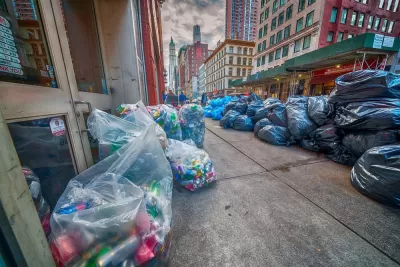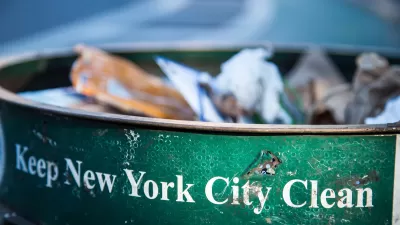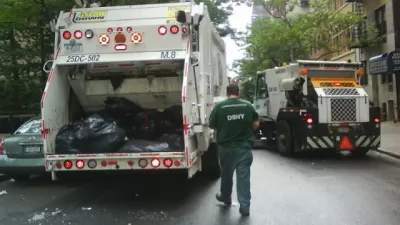The city’s sanitation department says the program, while successful on one block, would be too difficult and expensive to implement citywide.

A pilot program for ‘containerization’ of New York City’s garbage can’t be applied citywide, according to Department of Sanitation Commissioner Jessica Tisch. Kevin Duggan reports on the story for Streetsblog NYC, quoting Tisch as saying, “This is an incredibly resource-intensive pilot, and this approach is not scalable beyond its current scope.”
The department is evaluating possible avenues for containerization, the practice of streamlining trash collection by putting all trash in containers that can be picked up by automated cranes on trucks. “Tisch called the effort ‘one of the most complicated infrastructure projects’ for the city in the coming decade.”
While the pilot was successful in getting trash bags off the sidewalk, bags still ended up outside the containers, making it difficult to speed up the process since workers still have to exit trucks to load the bags. A successful container program requires frequent pickup, often once or even twice a day as opposed to the city’s current schedule of every two to three days. Meanwhile, the need to use curbside space previously reserved for parking is expected to receive pushback from some resident groups.
Residents and landlords in the pilot block, however, say the program vastly improved sanitation conditions. “On W. 45th Street, Streetsblog found about a month into the pilot that the bins kept the sidewalk blissfully clear of the usual mounds of black garbage sacks New Yorkers have to weave around on the eves of collection days.”
FULL STORY: Clean Curbs Pilot ‘Not Scalable’ Citywide, Says DSNY Commish

Alabama: Trump Terminates Settlements for Black Communities Harmed By Raw Sewage
Trump deemed the landmark civil rights agreement “illegal DEI and environmental justice policy.”

Planetizen Federal Action Tracker
A weekly monitor of how Trump’s orders and actions are impacting planners and planning in America.

Why Should We Subsidize Public Transportation?
Many public transit agencies face financial stress due to rising costs, declining fare revenue, and declining subsidies. Transit advocates must provide a strong business case for increasing public transit funding.

Understanding Road Diets
An explainer from Momentum highlights the advantages of reducing vehicle lanes in favor of more bike, transit, and pedestrian infrastructure.

New California Law Regulates Warehouse Pollution
A new law tightens building and emissions regulations for large distribution warehouses to mitigate air pollution and traffic in surrounding communities.

Phoenix Announces Opening Date for Light Rail Extension
The South Central extension will connect South Phoenix to downtown and other major hubs starting on June 7.
Urban Design for Planners 1: Software Tools
This six-course series explores essential urban design concepts using open source software and equips planners with the tools they need to participate fully in the urban design process.
Planning for Universal Design
Learn the tools for implementing Universal Design in planning regulations.
Caltrans
Smith Gee Studio
Institute for Housing and Urban Development Studies (IHS)
City of Grandview
Harvard GSD Executive Education
Toledo-Lucas County Plan Commissions
Salt Lake City
NYU Wagner Graduate School of Public Service





























